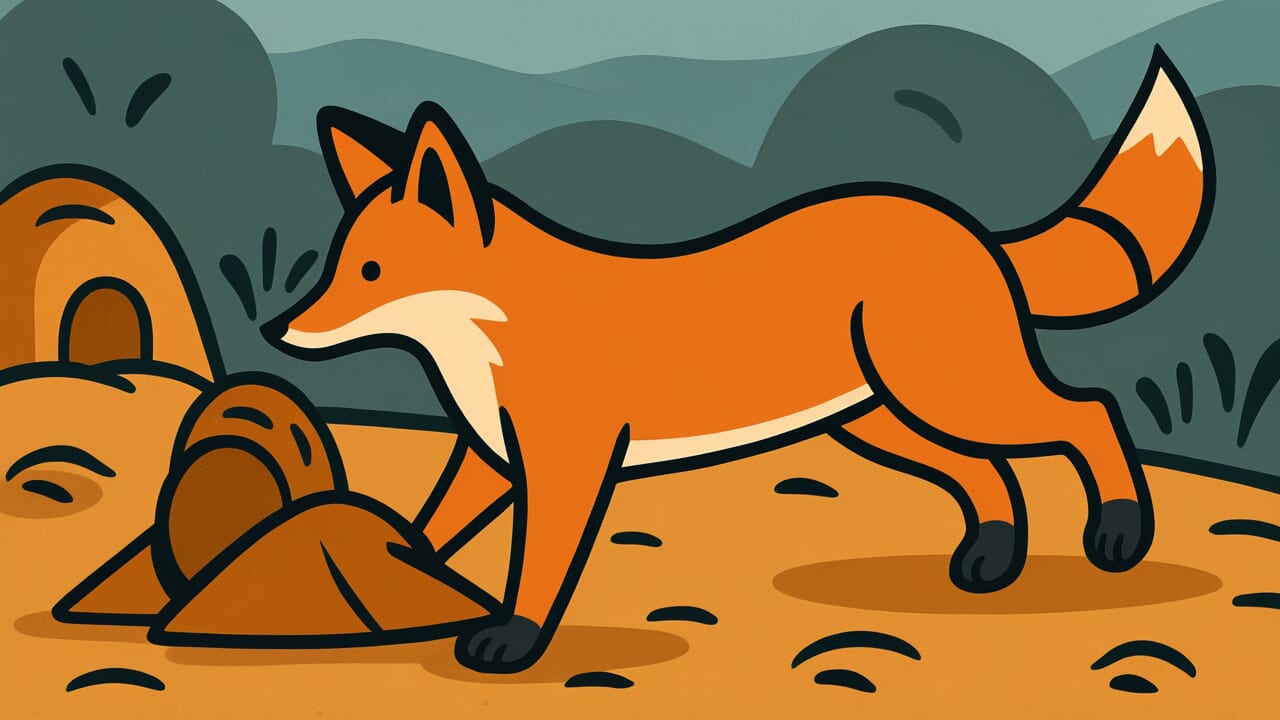How to Read “A fox buries it and a fox digs it up”
kitsune kore wo umete kitsune kore wo horu
Meaning of “A fox buries it and a fox digs it up”
This proverb describes how people of the same nature or position help each other. It can also mean partners who work together in wrongdoing.
Just as one fox buries prey and another fox digs it up, people of similar character understand each other’s actions. They cooperate naturally.
The saying often points to people who seem to act separately but actually share the same goal. They work for the same benefit.
It’s especially used to criticize those who commit wrongdoing together. One person hides the evidence while another uses it. They divide roles but cooperate smoothly.
Today, people use this proverb to point out those who participate in fraud or misconduct together. The meaning is close to “birds of a feather flock together.”
Because they’re alike, they understand each other’s intentions without words. They can coordinate seamlessly. This expression captures an essential truth about human relationships.
Origin and Etymology
This proverb likely comes from observations of fox behavior in ancient Chinese texts. Foxes have a habit of burying their prey instead of eating it right away.
They hide the catch in the ground. Later, they return to dig up what they buried and eat it.
What’s interesting is that both actions are done by foxes—the same type of animal. A fox buries it, and a fox digs it up.
The proverb draws from this natural observation. It expresses how those with similar natures cooperate, or how accomplices work together in wrongdoing.
Throughout history, foxes have appeared in Japanese culture as tricksters. They’re seen as cunning creatures that deceive people.
In China too, foxes appear in many stories and fables as clever animals. We don’t know exactly when this proverb came to Japan.
However, it was likely used among educated people who knew classical Chinese literature.
The paired actions of “burying” and “digging up” symbolically show a series of acts by similar beings. The structure itself emphasizes the meaning.
The image of the same animal performing two actions effectively conveys the proverb’s core message.
Usage Examples
- Those two are like “A fox buries it and a fox digs it up”—one hides evidence of fraud while the other uses it for profit
- The collusion between politicians and contractors is a classic case of “A fox buries it and a fox digs it up”—they just do favors for each other
Universal Wisdom
This proverb reveals a universal truth about human society. People of similar nature form unique bonds of solidarity.
Whether for good or bad, similar people intuitively understand each other’s thoughts and behavior patterns. They can cooperate without words.
Why do such relationships form? Because those who share the same values and goals have a common language that needs no explanation.
Honest people trust honest people. Cunning people team up with cunning people. This natural attraction has remained constant throughout human history.
Interestingly, this proverb is mainly used in negative contexts. It more often points to conspiracies among wrongdoers than cooperation among good people.
This is because our ancestors recognized the sophistication and danger of coordination among those who do wrong. One bad person can be dealt with.
But organized evil has serious impacts on society.
This proverb also warns us about actions that seem separate on the surface but actually coordinate for one purpose.
The one who buries and the one who digs may look like different people. But essentially, they’re the same fox.
The wisdom here is about seeing through invisible coordination working behind the scenes in human society.
When AI Hears This
In the universe, things naturally move toward disorder if left alone. This is the law of entropy increase.
Milk poured into coffee mixes on its own but never separates. Only life uses energy to create order against this physical law.
So the act of burying and hiding something is an advanced activity that goes against the universe’s natural flow.
What’s interesting here is the “digging it back up” behavior this proverb describes. Physically speaking, it’s wasting the energy used to create order.
It’s like spending an hour cleaning your room, then immediately messing it up yourself. The universe becomes disorderly on its own anyway.
Yet you deliberately use energy to create order, then use more energy to destroy it. It’s double energy waste.
The human mind has information processing systems like “wanting to check” and “feeling regret.” These must have evolved because they aided survival.
But they end up destroying order faster than physical laws would. Life is the only thing that can create order against universal laws.
Yet the internal system called the mind ruins that ability. This ironic structure may be the greatest contradiction in human existence.
Lessons for Today
This proverb teaches modern people the importance of developing discernment about people and organizations. We need more than surface observation.
We must develop insight to see the connections and common interests behind actions.
Especially in business and social life, people who seem to act separately may actually coordinate for the same purpose.
To detect fraud and unfair dealings, we need a perspective that observes overall patterns, not just individual actions.
At the same time, this lesson is a question for ourselves. Who are you teaming up with? Is that cooperative relationship honest toward society?
It’s natural for similar people to gather. But when that group becomes closed and lacks consideration for outsiders, you may unknowingly fall into an “A fox buries it and a fox digs it up” relationship.
To build a healthy society, transparency and diversity are important. Don’t settle into the comfort of being with similar people.
Value dialogue with people who have different perspectives. That’s the essential message this proverb offers to modern times.



Comments